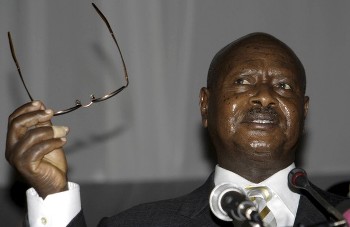Sudan accuses Uganda of harbouring rebel groups
May 3, 2014 (KHARTOUM) – The Sudanese government has accused Uganda of supporting and harbouring the rebel alliance of the Sudan Revolutionary Front (SRF) and says it has continued to interfere in the country’s internal affairs since president Yoweri Museveni assumed power.

He called for launching international, African and regional lobby attacks on Uganda.
On 23 April, the Ugandan Prime Minister Amama Mbabazi said his country filed a complaint with the Organisation of Islamic Cooperation (OIC) about Sudan’s alleged support for LRA.
“We had hoped that we had put all this behind us, but sadly, Sudan has not stopped supporting Joseph Kony and the LRA,” Mbabazi reportedly said.
The strained relationship between Uganda and Sudan deteriorated further with Khartoum recently recalling its ambassador to Kampala Hussein Awad Ali, over long held suspicions that Uganda was harbouring Sudanese rebels.
In a separate issue, Ismail underscored his party’s keenness to engage all rebel groups in the national dialogue, disclosing existence of several scenarios for their participation including dispatching delegations of independent national figures to meet with them and listen to their views.
He held the rebel Justice and Equality Movement (JEM) responsible for the recent killing of Sudanese nationals in Bentiu, saying it suffered heavy losses including extermination of its troops in Bentiu as a result of its involvement in the ongoing conflict in South Sudan.
In a statement issued on 21 April, the UN Mission in South Sudan (UNMISS) confirmed that more than 200 civilians had reportedly been killed and over 400 wounded at a Bentiu mosque when the town changed hands the week before.
UNMISS also accused the rebel SPLM-In-Opposition of separating civilians along tribal lines, saying Darfuris were specifically targeted and killed at the hospital along with other civilians.
PEACE TALKS
The NCP official called upon the government negotiating team to be cautious in the next round of talks with the rebel Sudanese People’s Liberation Movement-North (SPLM-N), saying the latter’s signing of peace agreements is contingent upon receiving “foreign orders”.
He expressed his government’s readiness to allow the SPLM-N to take part in all Sudan’s issues following an end the war and resolving the issue of South Kordofan and Blue Nile.
Ismail further disclosed that several attempts were made to transfer the issue of the Two Areas to the UN Security Council (UNSC), saying the Sudanese diplomacy managed to abort them.
The African Union’s (AU) mediation team suspended the stalled peace process aimed at ending the conflict in the Two Areas on Wednesday, as the government and SPLM-N delegations once again failed to conclude a framework agreement.
Last March, the AU Peace and Security Council (AUPSC) asked the head of the AU High Level Implementation Panel (AUHIP), Thabo Mbeki, to broker the talks in order to reach an agreement by 30 April 2014.
The AU mediators are expected to report to the AUPSC for further guidance.
(ST)
